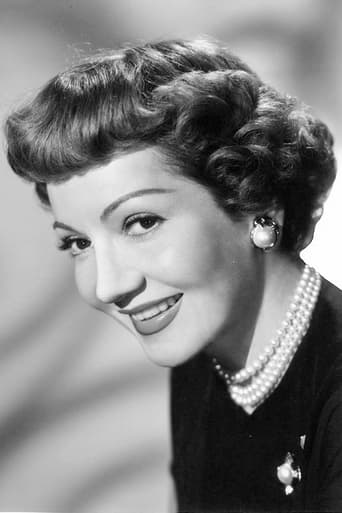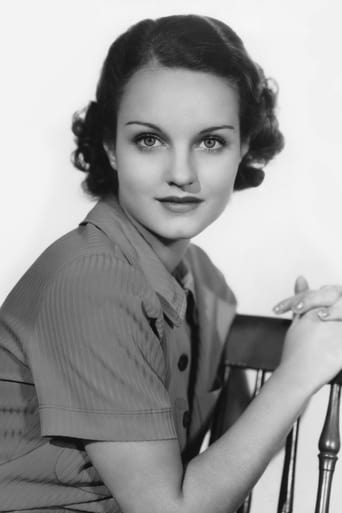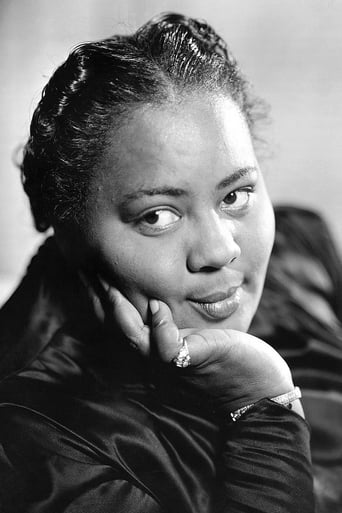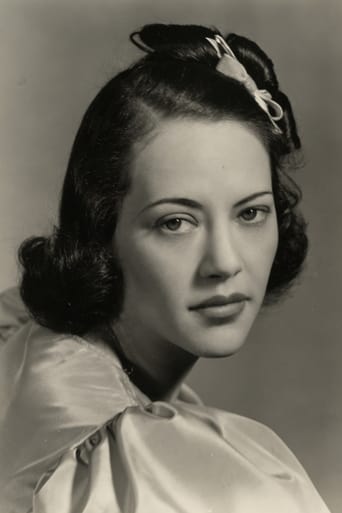Stevecorp
Don't listen to the negative reviews
CommentsXp
Best movie ever!
Mathilde the Guild
Although I seem to have had higher expectations than I thought, the movie is super entertaining.
Deanna
There are moments in this movie where the great movie it could've been peek out... They're fleeting, here, but they're worth savoring, and they happen often enough to make it worth your while.
paulknobloch
Melodrama relies heavily on archetype and hyperbole, and when it's done right, when it's pushed to the limit, it almost resembles Noh theatre: human existence as highly stylized ritual; pain, suffering and loss all boiled down into a series of tableaux so rigid that they almost become hieratic. It's a thoroughly unironic and direct means of getting at the truth, and that lack of irony is probably why it's fallen out of fashion. Done wrong, it's unpalatable kitsch. Done right it's high art. Few people understand how far to push it. Fassbinder did, and so did Douglas Sirk.And so did John M. Stahl…Unfortunately, Stahl is rarely mentioned alongside those other two stalwarts. In fact, he's often treated like a hack, an unfortunate buffoon who drove Tiffany Productions into the ground and had to resort to producing talking chimpanzee movies in order to survive.Nothing could be further from the truth.It's no wonder that Sirk remade three of Stahl's masterpieces: Imitation of Life, Magnificent Obsession, and When Tomorrow Comes. But where Sirk serves up subversion via camera angles, lighting, and a painterly control of Technicolor, Stahl comes right at you with static shots, costuming, big chunks of dialogue. A lot of my filmgeeky friends wince when I tell them that Stahl's Imitation of Life is even better than Sirk's, and it is.Stahl's 1934 version is as ostensibly political as any Hollywood film I have ever seen, dealing with issues of class and race and gender as directly as Straub-Huillet or Chantal Ackerman, only in the framework of mainstream cinema, which makes it all the more subversive. The fact that it was made pre-code probably has something to do with it, but still, this film pulls no punches. Imagine Marx and Freud filtered through a lens at a back lot in Burbank.The film, based on a Fannie Hurst novel, follows Claudette Colbert's character, Beatrice Pullman (there is more than one reference to Dante throughout the film, a reminder of the hell we all live in), who gets rich by boxing and mass-producing her African-American maid Delilah's pancake batter (see it for Louise Beavers' performance alone). For publicity's sake, Delilah is turned into an Aunt Jemimah-esque cliché, and later she's abandoned by her light-skinned daughter, who wants nothing more than to pass in the white world. In turn, Beatrice's life is complicated when her own daughter, Jessie, decides she wants to bed mommy's new beau, famed ichthyologist Stephen Archer. Ultimately, the film ends with a grim reminder that in a male-dominated world, female subjectivity, even for someone as insanely successful as Beatrice, is defined by a woman's ability to fill the gaping hole inside her with male adoration.Again, in the hands of most directors, this would be pablum, camp, kitsch. In the hands of John M. Stahl, it's as real as it gets.
eigaeye
This 1934 filmed version of the story, which is well written, acted and directed, is the one worth watching. The 1959 version, which is none of these things, has purely historical interest. And the historical interest is this: if these films are anything to go by, in the 25 years between them race relations and the filming-making craft in America both went into reverse. Concentrating on the treatment of race for a moment, while the rabbit's foot and the 'will to death' clichés about African Americans have gone out of the story by 1959, opportunities and recognition for their race are seemingly more elusive than before. The Annie character in the earlier film is a business partner (albeit an unequal one, a '20%er') of her white friend; in the latter version she is no more than her maid and occasional confidante. In the 1934 version, Annie's daughter conforms to the 'tragic mulatto' stereotype but retains personal dignity; in the 1959 version she conforms to the 'promiscuous mixed-blood' stereotype and ends in the gutter. Both scripts struggle to interconnect the relationship between the ambitious white woman and her daughter and the relationship of the black woman and her daughter, in terms of dramatic action, thematic content and comparative time on screen. Although the films place both relationships under the one roof, they run largely in parallel: problems of 'white folks' and problems of 'black folks' are perceived to be so separate. The latter version does worse in this regard. At least the 1934 version tries to bridge the gap by having the Claudette Colbert character go in search of the runaway Sarah Anne. Lana Turner's character just pitches in a few trite comments. This lack of emotional commitment robs the final scene in the 1959 film of any of the power that is present in the earlier version when Colbert goes to comfort Annie's daughter at the hearse. With its undistinguished supporting cast, a terrible score and sometimes laughable dialogue, the remake would, I suspect, have disappeared from critical discussion had it not for its 'controversial' subject-matter and the star pull of an aging Turner. The 1934 version still looks and feels somewhat brave; certainly it has a lot more heart and quality. The DVD's quality in sound and image are also good.
Greenster
This great film also deserves a Musical Review if that's all right with Tom Jones....Early one morning, Miss Bea labors bathing her daughter / Jessie the Baby must go off to day nursery / Bea was a widow / Peddling her syrup to purchase her daughter fine things.There at the door of the kitchen knocks a poor mother / Willing to work menial task to provide room and board / For her young daughter / Light like her father who took off to run his own way.Please, don't sigh, Delilah / Fry, fry, fry, Delilah / She would watch Jessie all day / Content to do much with slight pay / And cook up some pancakes to send Bea along on her way.Five years soon pass, and the bills are paid up at the restaurant / Rain on the boardwalk keeps customers staying away / Enter poor Elmer / For two stacks of pancakes, he'll gladly soon make it all pay.Meanwhile, Peola is passing for White in the third grade / Storm's coming down, and she'll soak without boots and her coat / Here comes Delilah / Claiming Peola, and giving her cover away.Cry, cry, cry, Peola / Why, why, why, Peola? / Your mother is not to blame / For there really is nothing to shame / She is your mother, but you hate her deeply the same.Ten more years pass, and Miss Bea throws an orchestra party / Money pours in, and they really receive their just fee / In walks Steven Archer / A promising suitor fantastically smitten with Bea.Peola is missing from school somewhere down in Virginia / Bea then tells Steven she must soon assist in the search / But there is Jessie / Who complicates matters and leaves Steven deep in the lurch.My, my, my, the turmoil! / Why, why, why, the turmoil? / Heartbreak, frustration and strife / Yield a true "Imitiation of Life" / Forgive them, Delilah; they just couldn't take anymore. / Forgive them, Miss Beatrice; they just couldn't take anymore.
Ed Uyeshima
Fannie Hurst's tear jerking 1933 novel about the sacrifices mothers make for their daughters spawned two popular movies separated by a quarter century of glacially-changing social attitudes - a highly regarded 1934 version that remains faithful to the book's narrative and an elaborate 1959 remake which changes certain plot details to service German-born filmmaker Douglas Sirk's heavily Baroque style of film-making. Both films maintain the same basic time-spanning storyline of two widows - one is a white woman who finds professional success but at a price that causes an unintended estrangement from her daughter, while the other is a black woman whose light-skinned daughter causes nothing but grief for all concerned.Directed by John M. Stahl, the black-and-white 1934 version focuses on Beatrice Pullman, a downtrodden white woman who bonds with Delilah Johnson, a cheery black woman, and opens up a waffle shop to support their daughters Jessie and Peola respectively. Their business becomes such a success that it gets franchised into a chain of coffee shops that market Delilah's waffle recipe and then turns into a major business venture producing the waffle mix en masse. Meantime, Delilah stays devoted to Beatrice as her maid (despite earning twenty percent of the company's profits), and together they raise their daughters. Beatrice eventually finds love with Stephen Archer, an ichthyologist for whom Jessie develops a crush. Far more seriously, Peola runs away to escape her black identity and puts Delilah into an emotional tailspin.In the same year she made "It Happened One Night" and DeMille's "Cleopatra", Claudette Colbert shows her trademark natural élan which allows her to be the emotional gravitational force her character Beatrice requires her to be. Louise Beavers, who made a career of playing sunny-faced maids, gets her one shot at a first-class role and plays Delilah with great poignancy despite the inherent racism behind the conception of the role. The rest of the cast is adequate, though the real standout is Fredi Washington, a seminal black actress who portrays Peola with searing resentment and deepening regret.






